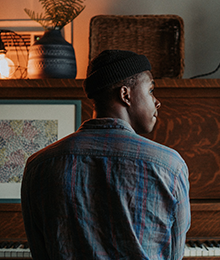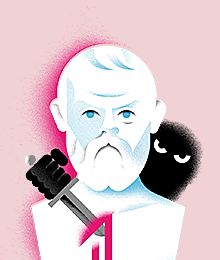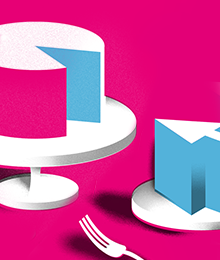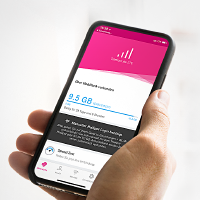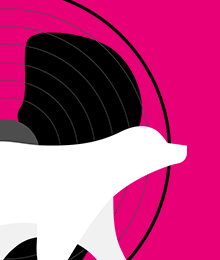Brave
new
World?
"A crisis is a productive state. You just need to remove from it the overtones of disaster."
Wise words from German author Max Frisch, yet they do not seem appropriate for the coronavirus pandemic. Or maybe they are? Eleven questions that concern us all…
 Anna
Anna
-
Fears of empty supermarket shelves, deserted city centers, reports of military transporters carrying corpses to overfilled crematoria, and new shocking coronavirus statistics every evening. What we only knew from movies has suddenly become reality. Yet while some people look back with a longing and ask themselves when things will finally return to how they were, Max Frisch would probably ask whether we want our old lives back at all. Or has the pandemic even done us some good perhaps?
One thing seems certain – it has made many of us stop and think. For example, is the constant “bigger, faster, more” really so life-enhancing? Would a slower pace of life help not only the environment but each and every one of us? Are not a sense of community and togetherness indeed more valuable than striving for ever-greater prosperity and success? We do not know when we will have overcome the coronavirus pandemic. However, according to futurologist Matthias Hort, more than half of us have absolutely no desire to go back to life before Covid. We take stock of the new normal.
 Raffi
Raffi
-
In lockdown, everyone gets together in video chats. Necessity is the mother of invention, whether for eating dinner with friends, playing games, or making music. Jimmy Fallon, host of the “Tonight Show” in the U.S., provides one example of how this creates amazing art. He regularly invites big names such as Sting to make music together online. For many people, the net has become the most important place for meeting with family and friends during the pandemic. A Bitkom study concludes that 40 percent of senior citizens view digitalization more positively than before and the majority of older internet users are coping better with the pandemic.
What’s more – although increasing numbers of people are online, the Deutsche Telekom network has run smoothly throughout the pandemic to date.
 Luisa
Luisa
-
And suddenly schools are shut. The last time that happened in Germany was after World War Two, when education ground to a halt. Now, lockdown sees the kitchen table transformed into a school desk.
The abrupt changeover to homeschooling has presented many families with major challenges. In particular, children whose parents cannot offer them the necessary support quickly reach the limits of their learning. And the lack of social interaction between students is also having a negative impact. However, the coronavirus pandemic has shown that, despite not being an alternative to classroom teaching, homeschooling can help bridge these times of crisis and provide a useful addition to lessons in the long term.
 Maria
Maria
-
Restrictions on travel, groups of multiple people no longer being allowed to meet in public spaces, and ordering quarantine – even though such measures for protecting health are useful and necessary, many of us wonder whether this isn’t damaging our democracy. Yet here, too, it appears that those who cannot meet offline meet online. Take, for example, the members of the Fridays for Future movement, who moved online when the pandemic started. Despite fewer young people getting involved online, coronavirus is not the end of the movement. Even new protest movements have emerged in the pandemic, such as those that campaign for the rights of workers in agricultural businesses and abattoirs.
The German Economic Institute (IW) in Cologne has also found out that there has been a huge increase in online petitions during the coronavirus pandemic. Up to five times more petitions were launched in March than before. “This clear rise in political protest in the digital arena shows that democracy can demonstrate resilience even in times of crisis,” according to the study’s authors.
 Chris
Chris
- And suddenly we reach the climate targets after all? Empty highways, empty planes,empty hotels. What is a nightmare for industries like tourism is a blessing for the climate: Scientists at the Technical University of Kaiserslautern have calculated the "corona effect" on the climate and are optimistic that Germany
- will be able to achieve the climate goals for 2020 after all, if the measures are continued a little. They found that in Europe, the demand for electricity has fallen by 19 percent, which has led to a 34% reduction in emissions in the erniergiesektur alone. Worldwide reports of up to 50% lower CO₂ emissions, better air quality and even dolphins in the canals in Venice* are making the rounds. Nature breathes a sigh of relief amidst the chaos? In any case, during the crisis, mankind has proven that it is very well capable of solving mankind's biggest problem in record time: climate change. If we have already achieved this once, can we not continue to do so? Radical renunciation as a solution to the climate crisis? It would be better if we could enjoy freedom and life and still protect the climate. Smart technologies are pointing the way forward: Greenpeace calculates that a gigantic 5.4 million tons of CO₂ emissions can be saved just by having employees leave their cars at home two days a week and work from home.
 Julia
Julia
-
No traffic jams, no hectic rush in the morning, fewer meetings, and less stress. This begs the question – can’t this slower pace of life continue, in general but especially in our working lives? In conurbations in particular, people have been benefiting from working from home since the start of the coronavirus pandemic – for example in London, where commuter jams of up to one-and-a-half hours were previously the norm. According to research by the BBC 50 of the largest employers are not planning to bring back their employees to their offices on a full-time basis for the foreseeable future.
For many companies, working from home will also become the norm in Germany over the long term, as the ifo Institute found in a corporate survey. Over half want to offer remote working solutions in the long term.
The success of numerous meetings online, which eliminates the need for business travel, also has consequences: “I’ll be traveling much less for work after the pandemic. I’m much more productive than when I’m on the move all the time,” says Deutsche Telekom CEO Tim Höttges.5,4Gigantic 5.4 million tons CO₂ emissions can be saved, if employees leave their car at home on two days in the week and work from home, Greenpeace suggests.
 Peter
Peter
-
To get the pandemic under control, over 18 million people in Germany have installed the Corona-Warn-App – Germany’s coronavirus contact tracing app – and are willingly collecting location data just four months after the app was released. And the number keeps rising. This is in Germany, no less, which other countries regard as overcautious when it comes to data protection. But Germans are completely relaxed – and rightly so, as the data remains anonymous and is kept locally on their cellphones.
This trust in data protection is vital to ensure large numbers of people download the Corona-Warn-App. Studies by the University of Oxford show that if only 15 percent of the population use contact tracing apps, the technology – when combined with further measures – can help contain the pandemic. The more people use these apps, the faster chains of infection can be broken and lives can be saved.60%If more than 60% of a population install and use Corona App, the Corona pandemic can be stopped
This is how the
app works
For the app to protect you properly, it is not enough to install it. It must remain open in the background and Bluetooth must be activated. Because the Corona Warning App uses Bluetooth to measure the distance and duration of encounters between cell phone users. The app remembers these data anonymously. If a user reports that he or she has tested positive, the app warns all people with whom there has been contact. A complex algorithm from the Robert Koch Institute calculates the risk.
 Markus
Markus
-
The slower pace of life and the difficulties resulting from the coronavirus pandemic are making us focus more intensively on increased social cohesion. We have been brought closer together while at the same time maintaining social distancing. Creative ideas, whether they involve live music in a backyard, assistance with shopping, or a courier service, are intended to help ease isolation, particularly for people in need. Many such initiatives have been organized online. The study “Gesellschaftlicher Zusammenhalt 2020” (social cohesion in 2020) by the Bertelsmann Foundation concludes that solidarity in Germany grew in the first few months after the outbreak of the pandemic.
The internet offers solutions for various crises, not just pandemics. For instance, in just a few clicks, it helps us find the closest neighbor with a drill to lend. Doing away with buying your own tool saves resources and the environment.
 Joel
Joel
-
In the corona pandemic, many people avoid going to the doctor's office due to their fear of catching a virus. Politicians have reacted by relaxing the rules and clearing the way for more online consultations. Especially for people who live in the countryside, this is a big step towards better health and quality of life, the annoying trip to the congested city is spared. But city dwellers also benefit, because boredom in waiting rooms is a thing of the past.
Be careful if you want to treat your diseases with "Dr. Google". Unlike doctors, he is not subject to confidentiality. You can find out what consequences this can have and how you can search for health information online without being tracked in our special on digital privacy.
 Darrell
Darrell
-
It’s a legitimate question. Streaming videos, watching series online, taking part in video chats with friends – all that generates CO₂ emissions. To ensure a TV show gets to your screen with razor-sharp definition, a great many bits and bytes have to travel a great distance, and that calls for plenty of energy. So are binge-watchers the new frequent fliers?
Prompted by the coronavirus pandemic, the Fraunhofer Institute has explored this question. After all, in the pandemic, data cables have been red hot, with everyone staying home and streaming videos. Four out of every five data packets that speed along the cables now carry video content. In the study, the Fraunhofer Institute discovered that, although whether binge-watchers harm the climate also depends on how much they stream, a much more crucial factor is the type of network they use. If you access a fiber-optic network via Wi-Fi in your home and watch your favorite series on your laptop for ten hours nonstop, you’re five times more environmentally friendly than if you watch the same series for only one hour on your cellphone on the 3G network. What’s more, as long as you surf on the Deutsche Telekom network, you’re being carbon neutral. This is because the network already runs entirely on renewable energy throughout Germany. From 2021, Deutsche Telekom will be relying on electricity from renewable energy sources across the Group. It is also committed to sustainability for data centers. For example, the company’s data center in Biere, Germany, is not just one of the most sustainable on the planet, it is a true data fortress.
Find out more in the article
The green data bunker
 Mikki
Mikki
-
How could we look at the coronavirus pandemic without including the toilet paper issue? We can order even that online nowadays, which makes us especially glad if the supermarket shelves are empty. Online shopping depends on a good network connection, whether in an urban or rural area.
While people living in the countryside were still being branded “uncool country bumpkins” in the 1990s, these days large numbers of urban residents are quite literally leaving for greener pastures. It isn’t just lower rents, better air, and peace and quiet that are decisive when opting for rural life – just as important is a good broadband connection, as today (almost) all of us live, learn, and work online. And those who today live in the countryside wish to #TAKEPART just as much as city dwellers.
Naturally this is only possible with a stable network that also proves its worth in times of crisis. That’s why each year, Deutsche Telekom invests billions in network expansion. In Germany, we have been the largest investor in this area for years. The coronavirus pandemic has shown that our investments have really paid off. Despite the heavy increase in data traffic, our network has so far remained stable – a strong signal, as it is particularly in times of crisis that we see how important the internet is for us all.
C
rises further underline existing inequalities. The “social cohesion in 2020” study conducted by the Bertelsmann Foundation concludes that coronavirus is worsening social inequality.
Even though Max Frisch highlights the opportunities offered by a crisis, we must not forget there are also losers. Those affected include people on lower incomes, who cannot make up for earnings lost due to reduced working hours. Parents who need to balance childcare with their work amid closed day-care centers and schools. And, last but not least, children, who particularly suffer from school closures, bans on contact, and quarantine. So it comes as no surprise that, according to a survey commissioned by the German children’s charity Deutsches Kinderhilfswerk, a large majority of Germans support the call to finally enshrine children’s rights in the German Basic Law.
